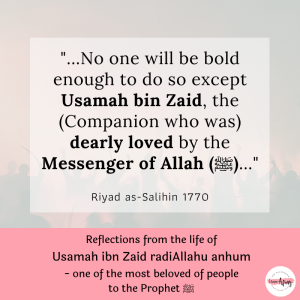
Usamah ibn Zaid radiAllahu anhum was the son of the Prophet salAllahu alayhi wa sallam‘s adopted son, Zaid ibn Harith radiAllahu anhu who had the blessed opportunity to have his name mentioned by Allah in the Qur’an (Qur’an 33:37). When I had first read about the young sahabah, Usamah ibn Zaid radiAllahu anhum, I was amazed at his bravery and at his leadership skills–to have been granted the honor to lead an army at an age when youngsters are generally caught between immaturity and lack of wisdom (speaking from personal experience 🙋♀️). Reading a bit more about him from Darussalam’s Child Companions Around the Prophet (peace be upon him), increased my admiration and love for the young sahabah for his character, his faith in Islam, his love for his father, his love for the Prophet salAllahu alayhi wa sallam, and most importantly, his devotion to Allah Subhanahu wa Ta’ala.
Reflections from the life of Usamah ibn Zaid radiAllahu anhum:
- Age is not a barrier to dream big and to work towards achieving those dreams. He was a young leader leading an army consisting some of the giants of Islam. Usamah radiAllahu anhu was an eager and keen warrior who was ever ready to sacrifice himself for the sake of Allah, even when he was barely the size of the armament he was carrying.
Narrated Ibn ‘Umar: that the Messenger of Allah (ﷺ) sent an army and put Usamah bin Zaid in charge of them. So the people contested his leadership, so the Prophet (ﷺ) said: ‘If you contest his leadership, then you did contest the leadership of his father before him. And indeed, by Allah, he was certainly fit for leadership, and he was of the most beloved of people to me, and this one is among the most beloved of people to me after him.'”
(Graded Sahih by Darussalam, Jami’ at-Tirmidhi, Vol. 1, Book 46, Hadith 3816) - Outer appearance, skin-colour, social status, race, and the likes do not define a person’s character. Usamah radiAllahu anhum was a dark-skinned man born to a fair-skinned father. Both, father and son, were among the most beloved to the Prophet salAllahu alayhi wa sallam.
Narrated Aisha, Ummul Mu’minin: The Messenger of Allah (ﷺ) entered upon me. The version of Musaddad and Ibn as-Sarh has: one day looking pleased”. The version of Uthman has: “The lines of his forehead were realised.” He said: O Aisha, are you not surprised to hear that Mujazziz al-Mudlaji (one who has great skill in reading the footprints and determining from them the origins and the branches even though they are far removed from those feet, as mentioned in Child Companions Around the Prophet, pg. 234) saw that Zayd and Usamah had a rug over them concerning their heads and letting their feet appear. He said: These feet are related. Abu Dawud: Usamah was black and Zaid was white.
(Graded Sahih by Al-Albani, Sunan Abi Dawud 2267)
The Prophet salAllahu alayhi wa sallam was pleased upon hearing this because it shows that though they are of different complexion, they are one and the same in blood, and in character. - Cultural beliefs and ideologies are not equal to one’s character, religion, and faith. At a time when one desires for a fair-skinned spouse, the fairness of his/her heart is not given importance.
It was narrated that: Abu Bakr bin Abu Jahm bin Sukhair Al-Adawi said: “I heard Fathima bint Qais say: ‘The Messenger of Allah said to me: “When you become lawful, tell me.” So I told him.’ Then Muawiyah, Abu Jahm bin Sukhair and Usamah bin Zaid proposed marriage to her. The Messenger of Allah said: ‘As for Muawiyah, he is a poor man who has no money. As from Abu Jahm he is a man who habitually beats woman. But Usamah (is good).’ She gestured with her hand, saying: ‘Usamah, Usamah!?’ The Messenger of Allah said to her: ‘Obedience to Allah and obedience to His Messenger is better for you.’ She said: ‘So I married him and I was pleased with him.'”
(Graded Sahih by Darussalam, Sunan Ibn Majah, Vol. 3, Book 9, Hadith 1869)
No one is immune to the desires of the world–be it in a beautiful spouse, a luxurious house, or the abundance of wealth. Barakah is in that which one feels blessed, content, satisfied, and filled with abundance regardless of the quantity. It is the quality that matters–quality of the heart, of the deeds, of the mind, of the soul.
What are some of your reflections from the life of Usamah ibn Zaid radiAllahu anhum? Let me know in the comments below.
Check out the following bloggers who have posted their reflections on this collaborative post–Learning from the Lives of Companions and Young Companions of the Prophet salAllahu alayhi wa sallam–on their blog and Instagram account:
- Dessert in the Desert on Asma bint Abu Bakr radiAllahu anha.
- Jeddah Mom on Fatima bint Muhammed radiAllahu anha.
- Atfalna Education on Umm Ayman radiAllahu anha.
- Level 10 Muslimah on Abdullah ibn Mas’ood radiAllahu anhu.
- Knowledge Dunes on Anas ibn Malik radiAllahu anhu.
- Ilma Education on Abdullah ibn Abbas radiAllahu anhu.
- The Odd Muslimah on Umm Umarah radiAllahu anha.
- Mothering the Nest on Umm Sulaym radiAllahu anha.


3 thoughts on “Reflections from the life of Usamah ibn Zaid radiAllahu anhum”